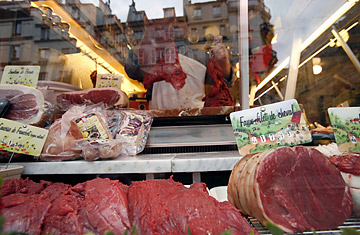
Horsemeat for sale at a Paris butcher shop
There's a growing debate in France about eating viande chevaline — and neither side is horsing around. Because what's at, er, "steak" in the dispute is whether France's 200-year tradition of consuming horsemeat will continue unimpeded, or if it — and the economic activity it generates — will be legislated into history at the behest of animal-rights activists who denounce it as unnecessary and cruel.
The push to ban horsemeat got a boost this month when the Brigitte Bardot Foundation, an animal-protection group started by the French actress, rolled out a public-awareness campaign to inform people of just how many of the creatures are butchered each year once their owners declare the horses' lives of riding, racing or hauling loads over. In addition to some particularly gruesome photos of the bloody butchering process, the ads include shots of children taking riding lessons atop noble-looking mounts, the heads of which are reflected in blood-splattered knife blades. In the text below are details like "Each year in France, numerous riding-center horses like Caramel are sent to the slaughterhouse."
But the Brigitte Bardot Foundation's offensive against the horsemeat industry isn't limited to tugging at heartstrings. The group has also enlisted conservative parliamentarian — and foundation board member — Lionel Luca to prepare legislation designed to alter the status of the French steed in a manner that would prohibit its sale as dinner. The draft of Luca's bill calls for horses to be reclassified in French law from animal de rente (or animal used to generate income) to animal de compagnie (domesticated animal). If introduced and passed, backers say, horses would then be covered under the European Convention for the Protection of Pet Animals, making the sale of their meat in France as illegal as that of dogs or cats.
Of course, to American and British ears (not to mention taste buds), forcing the French off their horse habit sounds about as reasonable an idea as getting them to stop scarfing snails. (And that's without even factoring in the emotional aversion to seeing a loin of Trigger or fillet of Black Beauty served with pepper sauce.) But opponents of the Brigitte Bardot Foundation effort say there's more than just culinary discernment behind their desire to keep alive a tradition that some historians trace back to the early 1800s, when Napoleon fed his famished soldiers horses slain during the Battle of Eylau.
French livestock associations — including those representing horse breeders and riders — note that over 95% of all horses in France are bred first and foremost for their ultimate marketing as meat. In 2008 alone, nearly 16,000 horses were slaughtered for that purpose in France — providing an income that riding centers, racing stables and other horse-related interests rely on to remain profitable. Horsemeat is also the main source of revenue for just over 1,000 horse-butcher shops in France, which were traditionally the only places in France to sell the meat, though in recent years, some ordinary butchers and food stores have also begun offering prepackaged cuts. Horsemeat brings in a tidy sum too: sales amounted to $238 million in 2005, the last year for which figures are available.
Opponents of the legislation also say that horses suffer no worse treatment than their peers in the beef, pork or poultry sectors, and they accuse animal-rights activists of selectively taking aim at a culinary tradition that won't crimp their own eating habits.
In the end, however, the dispute may be for naught, as the French seem to be drifting away from eating horsemeat of their own volition. Consumption of horsemeat in France has fallen steadily over the past two decades and by a whopping 12% since 2007. The 20,000 tons of viande chevaline eaten in 2008 represents less than 1% of all meat consumed in the country. That's half of what horse-hungry nations like Italy and Argentina eat, and just one-tenth of China's annual intake.
With French restaurants dropping horsemeat in droves, these booming markets abroad are already becoming a growing source of income for French horse breeders. So no matter what happens with Luca's proposed legislation, French horsemeat will continue to find its way to the dinner table somewhere in the world — a fact that undoubtedly rankles those who see the animals in terms of the lovable Monsieur Ed rather than tasty tartare.
